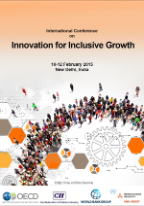The Lyon Declaration on Access to Information and Development
The Lyon Declaration of August 2014 was written in English. The wording of the English version shall prevail.The United Nations is negotiating a new development agenda to succeed the Millennium Development Goals. The agenda will guide all countries on approaches to improving people's lives, and outline a new set of goals to be reached during the period 2016-2030.
We, the undersigned, believe that increasing access to information and knowledge across society, assisted by the availability of information and communications technologies (ICTs), supports sustainable development and improves people's lives.
We therefore call upon the Member States of the United Nations to make an international commitment to use the post-2015 development agenda to ensure that everyone has access to, and is able to understand, use and share the information that is necessary to promote sustainable development and democratic societies.
Principles
Sustainable development seeks to ensure the long-term socio-economic prosperity and well-being of people everywhere. The ability of governments, parliamentarians, local authorities, local communities, civil society, the private sector and individuals to make informed decisions is essential to achieving it.In this context, a right to information would be transformational. Access to information supports development by empowering people, especially marginalised people and those living in poverty, to:
- Exercise their civil, political, economic, social and cultural rights.
- Be economically active, productive and innovative.
- Learn and apply new skills.
- Enrich cultural identity and expression.
- Take part in decision-making and participate in an active and engaged civil society.
- Create community-based solutions to development challenges.
- Ensure accountability, transparency, good governance, participation and empowerment.
- Measure progress on public and private commitments on sustainable development.
Declaration
In accordance with the findings of the High Level Panel on the Post–2015 Development Agenda, the post-2015 consultations of the United Nations Development Programme (UNDP) and the Open Working Group Focus Area Report, all of which identified the crucial role of access to information in supporting development, we, the undersigned, recognise that:- Poverty is multidimensional, and progress in eradicating poverty is linked to sustainable development across a variety of areas.
- Sustainable development must take place in a human-rights based framework, where:
- Inequality is reduced by the empowerment, education and inclusion of marginalized groups, including women, indigenous peoples, minorities, migrants, refugees, persons with disabilities, older persons, children and youth.
- Gender equality, along with full social, economic and political engagement, can be significantly enhanced by empowering women and girls through equitable access to education.
- Dignity and autonomy can be strengthened by ensuring access to employment and decent jobs for all.
- Equitable access to information, freedom of expression, freedom of association and assembly, and privacy are promoted, protected and respected as being central to an individual's independence.
- Public participation of all is ensured to allow them to take ownership of change needed to improve their lives.
- Increased access to information and knowledge, underpinned by universal literacy, is an essential pillar of sustainable development. Greater availability of quality information and data and the involvement of communities in its creation will provide a fuller, more transparent allocation of resources.
- Information intermediaries such as libraries, archives, civil society organisations (CSOs), community leaders and the media have the skills and resources to help governments, institutions and individuals communicate, organize, structure and understand data that is critical to development. They can do this by:
- Providing information on basic rights and entitlements, public services, environment, health, education, work opportunities, and public expenditure that supports local communities and people to guide their own development.
- Identifying and focusing attention on relevant and pressing needs and problems within a population.
- Connecting stakeholders across regional, cultural and other barriers to facilitate communication and the exchange of development solutions that could be scaled for greater impact.
- Preserving and ensuring ongoing access to cultural heritage, government records and information by the public, through the stewardship of national libraries and archives and other public heritage institutions.
- Providing public forums and space for wider civil society participation and engagement in decision-making.
- Offering training and skills to help people access and understand the information and services most helpful to them.
- Improved ICT infrastructure can be used to expand communications, speed up the delivery of services and provide access to crucial information particularly in remote communities. Libraries and other information intermediaries can use ICTs to bridge the gap between national policy and local implementation to ensure that the benefits of development reach all communities.
- We, the undersigned, therefore call on Member States of the United Nations to acknowledge that access to information, and the skills to use it effectively, are required for sustainable development, and ensure that this is recognised in the post-2015 development agenda by:
- Acknowledging the public's right to access information and data, while respecting the right to individual privacy.
- Recognising the important role of local authorities, information intermediaries and infrastructure such as ICTs and an open Internet as a means of implementation.
- Adopting policy, standards and legislation to ensure the continued funding, integrity, preservation and provision of information by governments, and access by people.
- Developing targets and indicators that enable measurement of the impact of access to information and data and reporting on progress during each year of the goals in a Development and Access to Information (DA2I) report.
